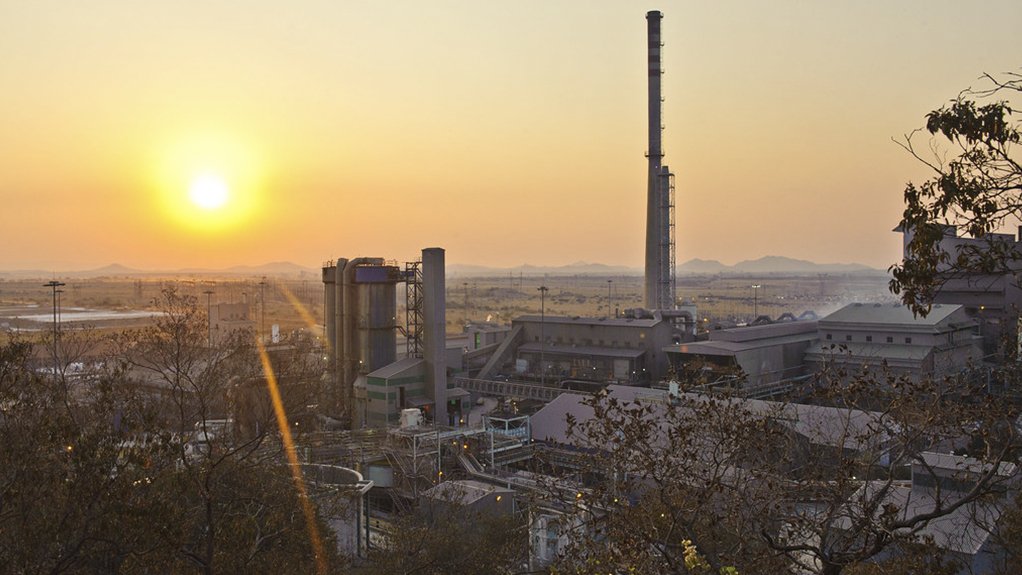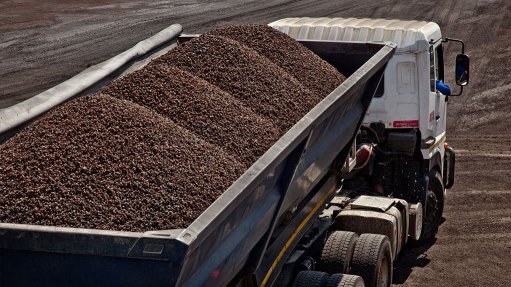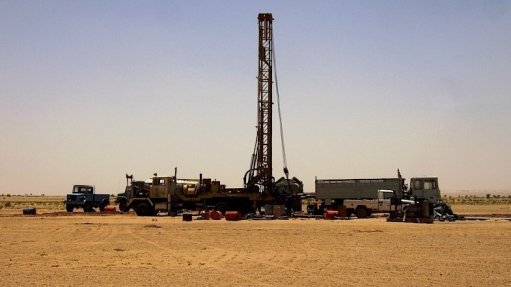Marikana memorial lecture speakers issue call to rebuild


Sibanye-Stillwater CEO Neal Froneman participated in the yearly Marikana memorial lecture. Video: Shadwyn Dickinson; Editing: Nicholas Boyd).
The Marikana mine
Speakers participating in the fourth Marikana memorial lecture, on August 14, called on South Africans, including those directly affected by the Marikana tragedy, to remember the struggle in South Africa for dignity.
Public benefit nonprofit organisation ReImagine South Africa executive director Luvuyo Madasa, who hosted the lecture, said the commemoration was to remember "the pain we inflicted on each other during those days [of August 10 to 16, 2012]".
He quoted the preamble to the Constitution, which was adopted to "heal the divisions of the past and establish a society based on democratic values, social justice and fundamental human rights.
Archbishop of Cape Town and patron of the Renewal Programme, which sponsors the yearly commemoration, Thabo Makgoba, emphasised the suffering and anguish experienced by the families of those slain during the strike and massacre.
"But the families have also shown that a fragile hope persists that we can create a society that treats safety and wellbeing as paramount. The wounds left by Marikana run deep and the only way to heal them is through honest dialogue, acceptance of collective responsibility and forgiveness.
"We must also continue to make spaces for dialogues among all stakeholders, including workers, their families and mining companies' and government representatives to find a way to respect human rights and address the economic disparities that still persist," he said.
'We must strive to be a society that ensures that the dignity and humanity of all are upheld and that the voices of the marginalised are heard and respected," said Makgoba.
Diversified mining and metals processing company Sibanye-Stillwater, which acquired the Marikana mine from Lonmin in 2019 and has held the commemoration each year since, highlighted some of the work it and its partners were doing to help those affected by the strike.
"Since the acquisition, in addition to the critical need to ensure the viability and sustainability of the operations to ensure they continued to benefit all the stakeholders in the region, we have significantly focused on dealing with the legacy of the most hurtful, damaging and terrible events of August 2012 by playing our part in bringing healing as far as possible," said Sibanye-Stillwater CEO Neal Froneman.
“Our vision for the future is that the efforts of us and other businesses can demonstrate the broad commitment of the business community to improve lives through stakeholder capitalism.
“The focus of Sibanye in all its operations is to use its financial, physical and environmental assets it is entrusted with, supported by intellectual, human and relationship capital, to create shared value and attain the best possible economic, social and environmental outcomes, for a broad range of stakeholders,” he said.
However, business cannot do this alone. A critical feature in the ability of any company to create shared value is the participation of a capable State that creates conditions for competitiveness in which business can flourish and play its part in promoting economic growth and social advancement.
“A lack of trust impedes progress. We believe that we are moving into a new phase of working together towards common objectives with all stakeholders,” Froneman said.
Stakeholder capitalism is about determining the most appropriate way of sharing value. It is also not focused on seeing community upliftment or the employment of people in its business as a requirement or risk, but as the right thing to do as a business and as individuals.
“We see return on efforts invested in supporting affected families, employing family members in our company and providing education opportunities to affected children in the greater energy of individuals in our company involved in these projects. And, as a successful business, we are then able to do more,” he noted.
Archbishop of Cape Town and patron of the Renewal Programme, which sponsors the yearly commemoration, Thabo Makgoba emphasised the suffering and anguish experienced by the families of those slain during the 2012 strike and massacre.
“But the families have also shown that a fragile hope persists that we can create a society that treats safety and wellbeing as paramount. The wounds left by Marikana run deep and the only way to heal them is through honest dialogue, acceptance of collective responsibility and forgiveness.
“We must also continue to make spaces for dialogues among all stakeholders, including workers, their families, and mining companies' and government representatives to find a way to respect human rights and address the economic disparities that still persist,” he said.
“We must strive to be a society that ensures that the dignity and humanity of all are upheld and that the voices of the marginalised are heard and respected,” said Makgoba.
The events surrounding the massacre showed the callousness of man, commented charity organisation Gift of the Givers founder Dr Imtiaz Sooliman.
"There continues to be lots of negative sentiment in the country. A country cannot be built on negative sentiment and, because of a lack of healing in the process, any minor challenge becomes a major issue," he added.
“I specialise in working in areas that are in disorder, [at] war and [that has faced] damaging natural and man-made disasters. I have seen how communities have torn each other apart in civil war; people on the same street, colour and community.
“However, our people said, as part of the peaceful democratic transition, that we are people of faith and believe in renewal and building. All we want is dignity.
“The aspirations of 60-million are not to have expensive German cars or to live in fancy high-rise buildings or luxury homes. We want dignity in how we feed our children, send them to school, access good healthcare, and to have good social cohesion, no crime and good neighbourliness.”
Additionally, he noted that there had been a change in how companies approach corporate social responsibility during the Covid-19 pandemic. Prior to that, all the calls he received from companies focused on tax certificates and black economic empowerment scorecards, and not on the quality of the projects being supported, said Sooliman.
“But, during Covid-19, it was the CEOs and MDs of companies, not office functionaries, who phoned me and said they were not interested in tax certificates or social responsibility points, but asked we how they could help to save the country.
“Sibanye and others are starting to set an example of bringing compassion into commerce, which aligns with the Islamic concept of Barakah that emphasises the reciprocity of charitable actions.
“To make our country grow, we cannot drop people. We have to pull them up with us and, in that way, everyone will prosper. If we leave them behind, they will pull us down and our society will collapse.
“The underdevelopment, especially pre-1994, was responsible for a lack of education and opportunities, leading to no incomes, jobs and development and people unable to look after their families.
“We inherited this and it is our duty to reverse it. We have a responsibility to our people.
“Let us restore the dignity of our people. The only way to do this is for government, corporations, religious organisations and nongovernmental organisations, and citizens to join hands. There is no barrier to making South Africa the great country we know it can be if we work together,” Sooliman said.
Article Enquiry
Email Article
Save Article
Feedback
To advertise email advertising@creamermedia.co.za or click here
Press Office
Announcements
What's On
Subscribe to improve your user experience...
Option 1 (equivalent of R125 a month):
Receive a weekly copy of Creamer Media's Engineering News & Mining Weekly magazine
(print copy for those in South Africa and e-magazine for those outside of South Africa)
Receive daily email newsletters
Access to full search results
Access archive of magazine back copies
Access to Projects in Progress
Access to ONE Research Report of your choice in PDF format
Option 2 (equivalent of R375 a month):
All benefits from Option 1
PLUS
Access to Creamer Media's Research Channel Africa for ALL Research Reports, in PDF format, on various industrial and mining sectors
including Electricity; Water; Energy Transition; Hydrogen; Roads, Rail and Ports; Coal; Gold; Platinum; Battery Metals; etc.
Already a subscriber?
Forgotten your password?
Receive weekly copy of Creamer Media's Engineering News & Mining Weekly magazine (print copy for those in South Africa and e-magazine for those outside of South Africa)
➕
Recieve daily email newsletters
➕
Access to full search results
➕
Access archive of magazine back copies
➕
Access to Projects in Progress
➕
Access to ONE Research Report of your choice in PDF format
RESEARCH CHANNEL AFRICA
R4500 (equivalent of R375 a month)
SUBSCRIBEAll benefits from Option 1
➕
Access to Creamer Media's Research Channel Africa for ALL Research Reports on various industrial and mining sectors, in PDF format, including on:
Electricity
➕
Water
➕
Energy Transition
➕
Hydrogen
➕
Roads, Rail and Ports
➕
Coal
➕
Gold
➕
Platinum
➕
Battery Metals
➕
etc.
Receive all benefits from Option 1 or Option 2 delivered to numerous people at your company
➕
Multiple User names and Passwords for simultaneous log-ins
➕
Intranet integration access to all in your organisation




















